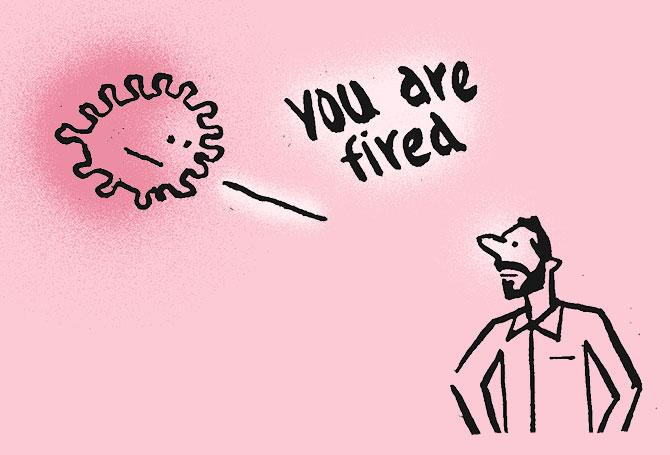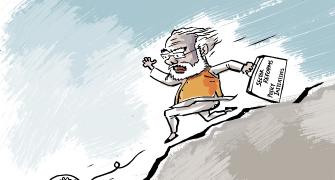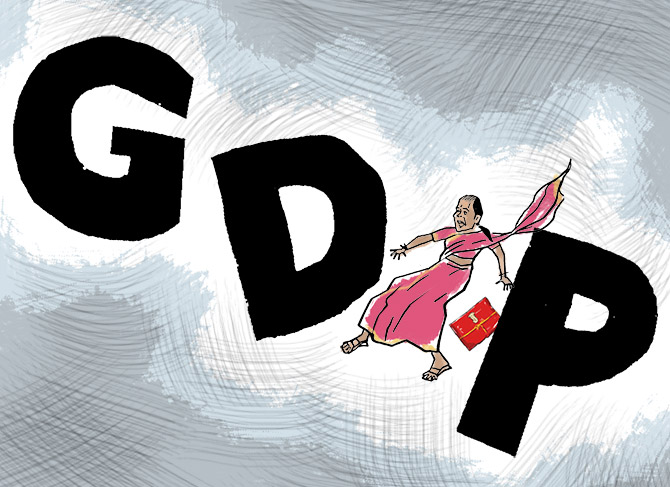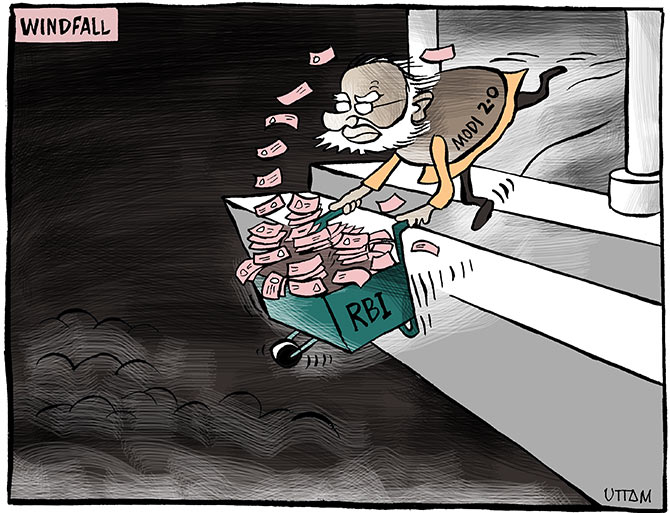The company stated that it was taking steps for cost rationalisation across all businesses to maintain liquidity and due to a prolonged slowdown it had to take a few tough measures.

In the first week of May, Dhirendra Mishra, a manager at Raymond, was called for a meeting with the management.
The government had just begun relaxing the lockdown norms and resumption of economic activities was in the air.
Mishra, who worked in the store department at the textile plant in Chhindwara (Madhya Pradesh), went to a guest house in Raymond’s residential complex, for the meeting.
Since a HR executive and his supervisor were already there, Mishra guessed the company may announce a pay cut.
But what followed in the next few minutes left him “numb’’.
“I was told to resign within 48 hours, failing which my employment contract would be terminated,” 50-year-old Mishra claimed.
“It couldn’t have been more devastating. I had worked in the company for almost three decades.
"I had declined all job offers as Raymond was in my blood. But now my fate was sealed,” he said.
Mishra, along with his colleague Vijay Sawarkar, a deputy general manager at Raymond (captive power plant) who had a similar experience, took up the matter with the authorities, sending out distress calls to both the district administration and the Central government.
The labour and employment ministry took up the concern and has asked the states to look into their complaints urgently.
Chhindwara sub-divisional magistrate Deepak Vaidya confirmed to Business Standard about receiving complaints from retrenched employees and said he would pursue with Raymond’s management.
Mishra, who had received a ‘long service award’ in 2016 by the company “in recognition of commitment and dedication towards the success of the organisation”, refused to resign for at least two weeks when he was first asked to step down in early May.
“I got calls from the company management on my landline or on WhatsApp asking me to resign as they said I will lose out on some benefits if I am retrenched,” said Mishra.
He is the sole bread earner in the family with two children.
Finally, on May 23, Mishra and Sawarkar were separately summoned, again at the guest house of the Raymond Vijaygram Colony, where they were handed the termination letters.
“We have carefully reviewed the manpower requirement and have come to the conclusion that, given the uncertain economic scenario, it is prudent to operate with a lesser headcount,” Raymond said in the termination letters.
The company stated that it was taking steps for cost rationalisation across all businesses to maintain liquidity and due to a “prolonged slowdown” it had to take “a few tough measures.”
Both the retrenched employees wrote to the Union home and labour ministries on May 25.
The complaint stated that they were ready to work at half the actual income, but if their services were not protected they along with their families would be in a hand-to-mouth situation.
There was no plan B they could fall back on as all factories were shut without any chance of a new job.
The complaint was acknowledged by Union home secretary Ajay Kumar Bhalla’s office and forwarded to the government’s control room.
Labour ministry’s Covid-19 nodal officer S K Sahu sent the representation to the Madhya Pradesh government for taking “urgent necessary actions to resolve the dispute”.
Similar incidents were narrated by some other employees who worked at Raymond’s Jalgaon plant in Maharashtra.
Business Standard reached out to Raymond for a response and the company, while denying that it had retrenched “workers”, said it had to rationalise some managerial roles.
“We vehemently and categorically deny all assertions, and would like to put on record that not a single worker has been terminated from our plants at Chhindwara and Jalgaon.
"Any such process, if undertaken, has to go through the recognised union at the plants and respective laid down processes,” a Raymond spokesperson said.
The Industrial Disputes Act of 1947 applies to what is known as ‘workmen’ in legal parlance.
Workmen are those engaged to do manual, unskilled, skilled or technical work but do not include people in managerial or administrative role or supervisors earning more than Rs10,000 a month.
In other words, the companies have to follow the due process of the law before retrenching ‘workmen’ but not managerial staff.
In its statement, Raymond added it had undertaken the process of cost rationalisation to minimise the impact on business due to the pandemic.
“This exercise is impacting some managerial positions across our facilities as the cost reset is absolutely essential to maintain liquidity and also ensure that we emerge stronger out of this crisis.
"All the said measures and actions are taken in the overall interests of all stakeholders.
"We would not want to offer any further comment on the hearsay, speculative and factually misplaced nature of your queries,” the company spokesperson added.
The company, however, didn't respond specifically to a query on the headcount in February 2020 and now, besides some other questions.
According to reports published a fortnight ago, 800 out of around 7,000 employees of Raymond across the country were asked to go.
The retrenchment was preceded by a steep salary reduction.
Beginning the salary month of April, the company decided to put employees at its plants in MP and Maharashtra in three slabs - for cutting pay by 20, 50 and 65 per cent.
Mishra and Sawarkar had to go through a pay cut of 65 per cent before they were asked to go.
“The action by Raymond can be legally challenged on the grounds that there was a steep salary reduction of employees before the retrenchment.
"The court will have to determine whether it was a bona fide or a mala fide intent to reduce the liability of the firm towards retrenchment,” Labour economist and XLRI Jamshedpur professor K R Shyam Sundar said.
Raymond, like other companies, has been impacted by the long lockdown, grinding economic activities to a halt.
Companies across sectors have resorted to retrenchments, layoffs, and salary cuts to reduce cost of operations as revenues dried up.
The retrenchment of the managerial level employees (not covered under the ID Act, 1947 as explained earlier) at Raymond is continuing even this week.
47-year-old Ashutosh Jha, a deputy manager in the finishing department of Raymond’s Chhindwara plant, was handed over the termination letter on Monday when he refused to resign.
“The executives told me there is no provision for (protection of) managerial staff in any law. If you resign gracefully, it will help you in getting a job,” Jha said.
His termination letter stated that “if due to business exigencies, company has right to recruit employees, then in uncertain economic scenario, as a matter of policy, company has a right to rationalise its existing manpower by dispensing the services of its employees to maintain liquidity and sustainability.”
Nikhil Tripathi (name changed), another managerial-level employee who worked at the Jalgaon plant for three decades, was told about the company’s plans of retrenchment in the first week of May over a WhatsApp call.
Sawarkar hasn’t removed Raymond’s signature tune from his mobile phone ringtone.
But, he has nowhere to go during the pandemic.










